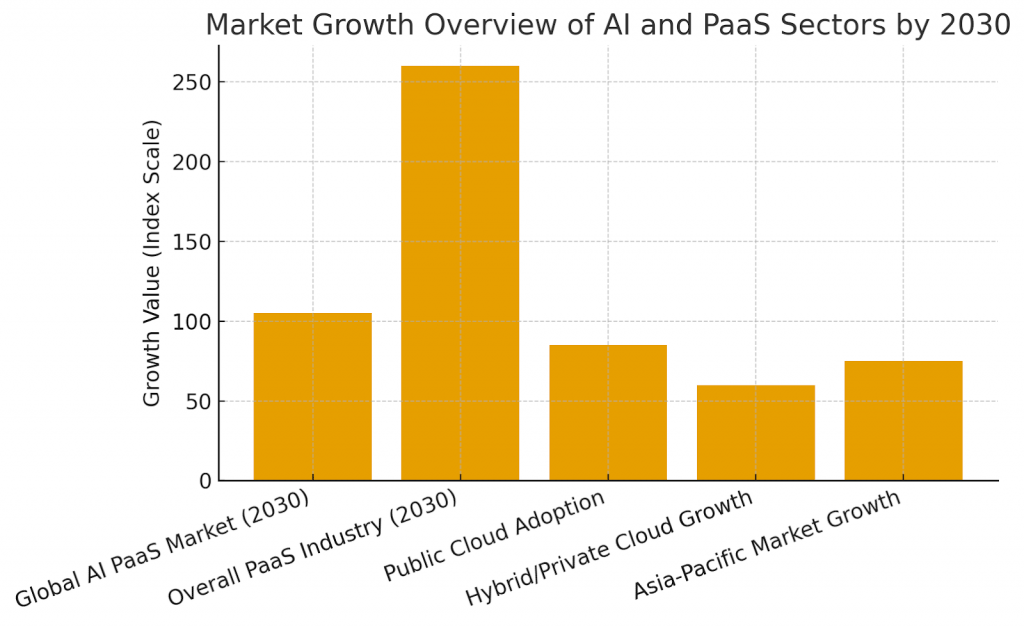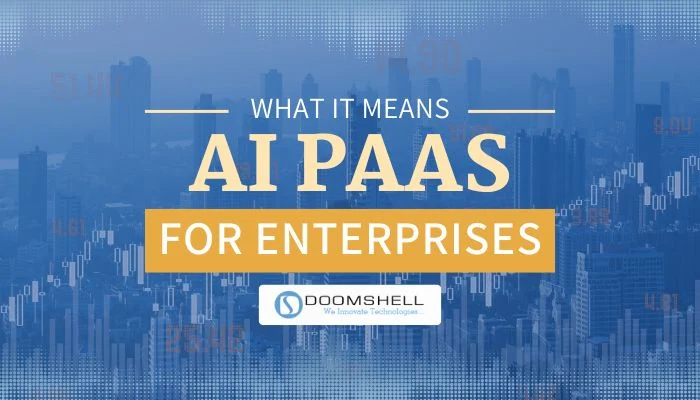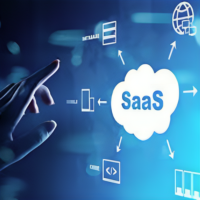Key Takeaway
- Typically, enterprises that adopt AI technologies face obstacles such as high infrastructure costs, a lack of skilled professionals, and long implementation processes, which in turn make traditional AI development difficult.
- With AI PaaS (Platform as a Service), the situation is made much easier as it delivers ready-to-go, cloud-based tools, off-the-shelf AI models, and a flexible infrastructure to businesses which in turn can deploy AI solutions in a hurry and at a lower cost.
- Such platforms offer extremely valuable features such as low-code user interfaces, sophisticated analytics, automated machine learning, and smooth integration with existing enterprise systems thereby lessening the technical challenges.
- This method allows companies to speed up their digital transformation journey, improve decision-making through real-time insights, and open AI usage to non-technical teams.
- While AI PaaS is loaded with benefits, enterprises still need to be vigilant about issues like data privacy, difficulties in integration, and the risk of vendor dependency when selecting a platform.
Market Analysis of AI PaaS Enterprises
- Globally, the AI PaaS market is expanding at a fast pace. It is anticipated to be worth close to 105 billion US dollars in 2030 and has a yearly growth rate of more than 40%. Besides, the overall PaaS sector is going to be worth more than 260 billion US dollars, which is an indication of strong worldwide adoption.
- The demand is mainly fueled by the advent of generative AI, large language models, and real-time data processing, which are forcing enterprises to opt for scalable, high-performance, cloud-based infrastructures.
- Companies are discontinuing the use of on-premise systems and turning to cloud-native, low-code/no-code AI platforms in order to cut down on expenses, accelerate their go-to-market strategy, and make it possible for other departments to innovate.
- Although most of the scalable and affordable solutions are found in public clouds, hybrid and private clouds are becoming more prevalent in highly regulated sectors like banking, healthcare, and government as a result of the increasing need for privacy.
- There are some problems that the market has to deal with such as vendor lock-in, integration with legacy systems, and data security concerns, thus giving rise to opportunities for companies that provide modular, AI-driven, and multi-cloud PaaS solutions.

Introduction
AI PaaS is a cloud computing and AI-powered platform hybrid that businesses can use to create, launch, and oversee AI models without having deep technical knowledge. It provides off-the-shelf algorithms, a scalable data infrastructure, and tools that are friendly to developers to the implementation phase very quickly. To put it simply, AI PaaS is a means of breaking down complex AI workloads by handing over pre-existing setups that firms are free to adapt to their particular objectives.
Major cloud providers like AWS, Google Cloud, and Microsoft Azure are investing in their AI PaaS ecosystems to support enterprises in process automation, making better decisions, and, getting, a step further, by means of the data-driven intelligence, deeper insights.
Key Features of AI PaaS
- AI PaaS platforms are designed to accommodate diverse company requirements. In general, they consist of:
- Pre-built AI Models for scenarios like image recognition, natural language processing, and predictive analytics.
- Low-Code/No-Code Interfaces that allow business users to create applications without much effort.
- Integrated Data Management Tools for the processes of cleaning, labeling, and handling datasets.
- Automation and ML Ops Tools for the activities of model training, deployment, and monitoring.
- Security & Compliance Frameworks that provide enterprise-grade security for sensitive data.
By having these features at their disposal, firms can dedicate more time and resources to producing the desired results, e.g., gaining deeper insights, enhancing customer experiences, and increasing operational efficiency, instead of being concerned with technical complexities behind the scenes.
What is the Platform as a Service and How does it work ?
Platform as a Service is a cloud-based environment that provides the functionalities to business and developers to create, test, and deploy software applications in an efficient way.
Developers don’t have to set up the hardware or manage the software updates; they just log in to the PaaS platform and start their work.
Some of the widely known PaaS providers are Google App Engine, Microsoft Azure App Services, AWS Elastic Beanstalk, and Heroku.
How does it work?
- Cloud Infrastructure: All the essentials servers, storage, databases, and networking are hosted by the service provider in the cloud. Users can utilize these resources through a secure internet connection.
- Development Tools: A PaaS provides the developer with numerous integrated instruments such as a code editor, a test environment, and automatic deployment. Thus developers are free to concentrate on programming their app while the system is set up and configured automatically.
- Middleware & Runtime: The package also has middleware (software that links the app with the database and other systems) plus runtime environments (like Java, Python, or Node.js) to make sure the app is working correctly.
- Database & Storage Management: PaaS platforms are equipped with the integration of databases as well as the file storage systems so which developer will be able with ease to store and retrieve data of the applications.
- Scalability & Maintenance: By the usage of the platform, resources are scaled up or down automatically depending on the user and also the updates, backups, and maintenance of the system are taken care of by the platform, thus IT teams are less burdened.
Benefits of AI PaaS for Enterprise
- Accelerated AI Development – An AI PaaS offers tools, frameworks, and APIs that are ready for use by enterprises to build and deploy AI solutions fast without the need to manage a complex infrastructure.
- Cost Efficiency – By providing a pay-as-you-go model, the AI PaaS eliminates the need for costly hardware and software investments, thus making AI adoption affordable.
- Scalability and Flexibility – AI PaaS adjusts the computing resources to meet the business requirements efficiently, thus allowing enterprises to manage different workloads.
- Access to Advanced AI Technologies – The use of cutting-edge machine learning models, NLP tools, and data analytics capabilities without the need for in-house AI expertise is made possible for enterprises.
- Enhanced Security and Compliance – The best AI PaaS providers guarantee that the enterprise data is secured through robust data protection, encryption, and compliance with international standards.
Top Industries Leveraging AI PaaS in 2025
- Healthcare – Uses AI PaaS for various purposes ranging from medical imaging analysis and predictive diagnostics to patient data management and personalized treatment recommendations.
- Banking and Financial Services (BFSI) – Employs AI PaaS in activities such as fraud detection, credit scoring, algorithmic trading, and customer service enhancement via chatbots and automation.
- Retail and E-commerce – Applies AI PaaS to enable the delivery of personalized recommendations, demand forecasting, inventory management, and intelligent customer engagement.
- Manufacturing – Has AI PaaS onboard for predictive maintenance, quality control, supply chain optimization, and process automation that results in lesser downtime and cost savings.
- Education – Harnesses the power of AI PaaS for adaptive learning platforms, student performance analytics, and administrative operations automation to facilitate better learning outcomes.
How AI PaaS Simplification Enterprises AI Adoption
- Eliminates Infrastructure Complexity – By offering a ready cloud-based environment, AI PaaS frees enterprises from the task of setting up and managing costly servers, GPUs, and storage systems.
- Accelerates Development Cycles – Through the use of pre-built AI models, APIs, and drag-and-drop tools, enterprises become able to rapidly construct, train, and deploy AI applications without holding deep technical knowledge.
- Reduces Cost and Risk – The pay-as-you-go model is what allows organizations to initiate AI projects as an experiment with a smaller budget, thus reducing the risk of money while they can only scale when it is necessary.
- Ensures Seamless Integration – AI PaaS is compatible with the present systems of the enterprise (such as CRM, ERP, or data warehouses), thus merging the adoption process without the interruption of routine activities.
- Provides Continuous Innovation – The enterprises are given the opportunity to benefit from the PaaS provider’s automatic updates, new AI tools, and frameworks, thus having access to the latest technologies without the need for manual maintenance.
Challenges of AI PaaS
- Data Privacy and Security Risks – The situation becomes alarming when sensitive enterprise data is handled in cloud-based AI environments, as this raises the issues of breaches, compliance, and data protection.
- Integration with Legacy Systems – The problem that most enterprises have is the difficulty of linking AI PaaS platforms with their current infrastructures, which results in the problems of compatibility and data flow.
- Hidden and Rising Costs – In spite of the fact that AI PaaS cuts down the expenses of the setup, the long-term usage, scaling, and data storage may cause the increase of operational costs.
- Lack of Skilled Professionals – To utilize AI tools properly, the need for technical knowledge is a must, which most organizations do not have, thereby the process of adoption and innovation gets delayed.
- Vendor Lock-in – Being dependent on a single provider to a great extent may cause the limitation of the flexibility, customization, and control over AI models and infrastructure.
Conclusion on AI PaaS for Enterprises
AI PaaS is fundamentally changing the way big companies use and expand artificial intelligence by making the complicated infrastructure easy to understand, lowering the costs, and speeding up the new product or service development. With it, companies are enabled to concentrate on creating intelligent applications instead of dealing with the backend systems. However, there are still issues of data privacy, integration, and vendor dependency, but the ongoing improvements of AI instruments, automation, and security are facilitating the availability and trustworthiness of AI PaaS. By the time the technology gets mature after 2025, the business organizations which will have adopted AI PaaS early, will be the ones to enjoy a tactical superiority due to their flexibility, effectiveness, and ability to make decisions based on data. Consult with the mobile app development company in USA.
Important FAQs On AI PaaS for Enterprises
1. What is AI PaaS and why enterprises need it?
AI PaaS (Artificial Intelligence Platform as a Service) is a cloud-based platform that includes the necessary components, such as tools, frameworks, and hardware, for building and deploying applications powered by AI. This platform assists enterprises in implementing AI easily, cutting down on expenses and speeding up the process of coming up with new ideas.
2. How can AI PaaS improve business operations?
With the help of AI PaaS, businesses can become more efficient through automation of activities, access to on-demand computing power, and quick rollout of AI models thus, no heavy infrastructure management is required.
3. What are the issues that most limit AI PaaS implementation?
Large corporations could be troubled with different problems such as data privacy issues, difficulty in integrating with old systems, and reliance on certain vendors. To get past these obstacles, it is necessary to have a well thought-out plan and strong governance in place.













































